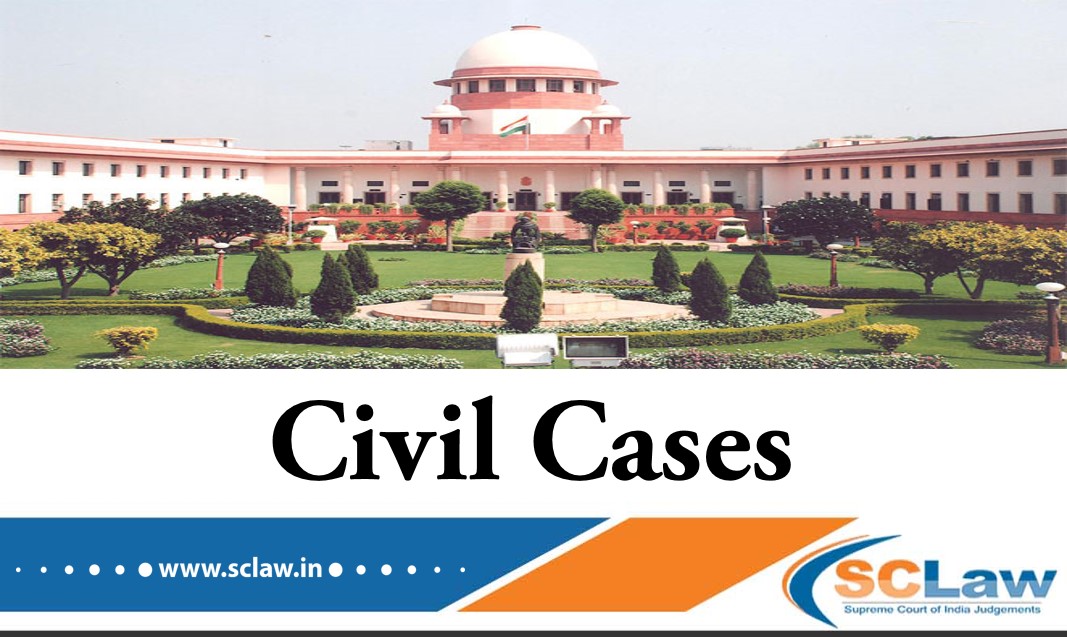Kannan Devan Hills (Resumption of Lands) Act, 1971 – Sections 4 and 5 – Land in question – State has legislative competence to legislate on Entry 18, List II and Entry 42 List III. This power cannot be denied on the ground that it has some effect on an industry controlled under Entry 52, List I. Effect is not the same thing as subject-matter
AIR 1972 SC 2301 : (1972) 2 SCC 218 : (1973) 1 SCR 356 SUPREME COURT OF INDIA THE KANNAN DEVAN HILLS PRODUCE — Appellant Vs. THE STATE OF…
Partnership Act, 1932 – Section – 69 – Civil Procedure Code, 1908 (CPC) – Order 30 Rule 4 – Promissory note – The respondents filed a suit to recover a sum of Rs. 58,880 on the foot of a promissory note dated April 1, 1960 to recover the principal sum of Rs. 46,380 and interest which accrued thereon – The respondent- firm is a registered partnership firm and under Section 69 of the Partnership Act, the suit is maintainable
(1996) 8 AD 562 : (1997) 1 BC 503 : (1996) 10 JT 38 : (1996) 8 SCALE 17 : (1996) 11 SCC 480 : (1996) 7 SCR 152…
Partition – What manner the property are required to be enjoyed in equal shares? – On perusal of the partition deed, it is clear that the view of the High Court is not correct. It is seen that the ground floor was allotted to both the appellant and the respondent for common enjoyment and first floor was allotted to one party and second floor was allotted to another party
(1996) 8 AD 553 : (1996) 8 SCALE 243 : (1996) 11 SCC 496 : (1996) 7 SCR 812 Supp SUPREME COURT OF INDIA K.M. SRINIVASAN — Appellant Vs.…
Punjab Municipal Act, 1911 – Section – 61, 62, 68 – Levy of property tax – The delegation of power to levy property tax in favour of the Chief Administrator of Union Territory of Chandigarh Administration was in excess of legislative power
(1996) 8 AD 391 : (1996) 8 SCALE 13 : (1996) 11 SCC 497 : (1996) 7 SCR 315 Supp SUPREME COURT OF INDIA CHIEF COMMISSIONER, UNION TERRITORY, CHANDIGARH…
Validity of the charge memo – A charge memo imputing misconduct on his part was issued to respondent – The respondent filed O.A. in the Administrative Tribunal challenging the validity of the charge memo dated September 28, 1991. The Tribunal in the impugned order dated April 15, 1994 set aside the charge memo on the ground that the charges were vague
(1996) 8 AD 728 : (1997) 75 FLR 2 : (1996) 10 JT 40 : (1997) 2 LLJ 1011 : (1996) 8 SCALE 14 : (1996) 11 SCC 498…
Customs Act, 1962 – Section – 15(1), 46(5) – Exemption from duty – Appeal relates to the applicability of the Notifications No. 439/86 and No. 440/86, dated October 6, 1986 whereby partial exemption admissible in respect of basic customs duty and auxiliary customs duty on wood and articles of wood falling under Notifications was withdrawn
(1997) 94 ELT 454 : (1997) 11 SCC 654 SUPREME COURT OF INDIA KHATTAR ENTERPRISES (P) LTD. — Appellant Vs. COLLECTOR OF CUSTOMS, CALCUTTA — Respondent ( Before :…
Constitution of India, 1950 – Article – 14 – Claim for exemption – Respondent company is entitled to the benefit of the exemption notification – In order to be treated as a manufacturer the respondent must not hold any share in the capital of any foreign company and no part of the capital of the respondent company must be held by a foreigner or a foreign company.
(1999) 107 ELT 579 : (1997) 11 SCC 657 SUPREME COURT OF INDIA UNION OF INDIA (UOI) AND ANOTHER — Appellant Vs. SUHRID GEIGY LTD. — Respondent ( Before…
Constitution of India, 1950 – Article 136 – Promotion – Appellant promoted from Asstt. Sub Inspector to Sub-Inspector. w.e.f. 11-8-1992 – Claims promotion from 25-7-1990 when his juniors were promoted
(2000) 7 JT 460 : (2000) 9 SCC 140 : (2000) SCC(L&S) 875 SUPREME COURT OF INDIA LACHHMAN SINGH — Appellant Vs. STATE OF PUNJAB AND OTHERS — Respondent…
Migration to the Medical College – The Migration Sub-Committee of the Medical Council of India rejected the application whereupon a writ petition was filed on 30th July, 1998 in the High Court. By order dated 26th March, 1999, respondent No. 1 was allowed to attend the 2nd Year MBBS classes at the Government Medical College, Aurangabad and it is this order which is challenged in the present case
(2000) 5 JT 498 : (2000) 9 SCC 163 SUPREME COURT OF INDIA nt Vs. DIPARANI P. DESHMUKH AND ANOTHER — Respondent ( Before : S. S. M. Quadri,…
Promotional avenue – Counter affidavit was filed by the State of Karnataka to the effect that the Government proposed an amendment to the Rules by creation of post of Probation – Whether the Appellants could be granted any money compensation.
(2000) 87 FLR 23 : (2000) 7 JT 442 : (2000) 9 SCC 175 : (2000) SCC(L&S) 879 SUPREME COURT OF INDIA K. NARAYANI HEGDE (DEAD) BY LRS. —…














